

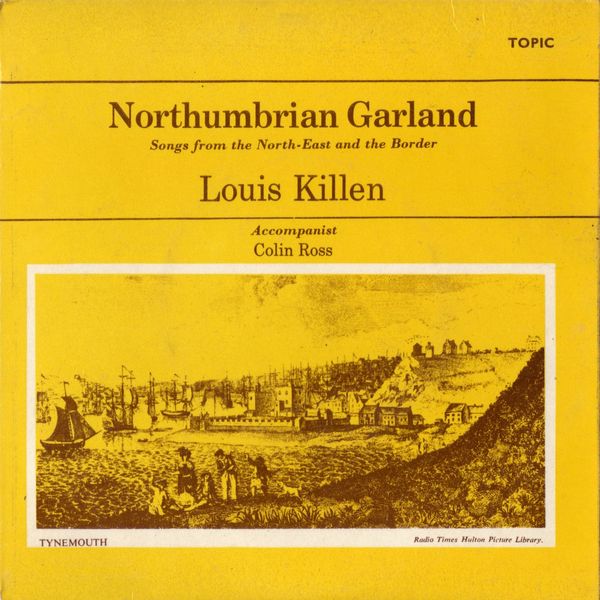 |
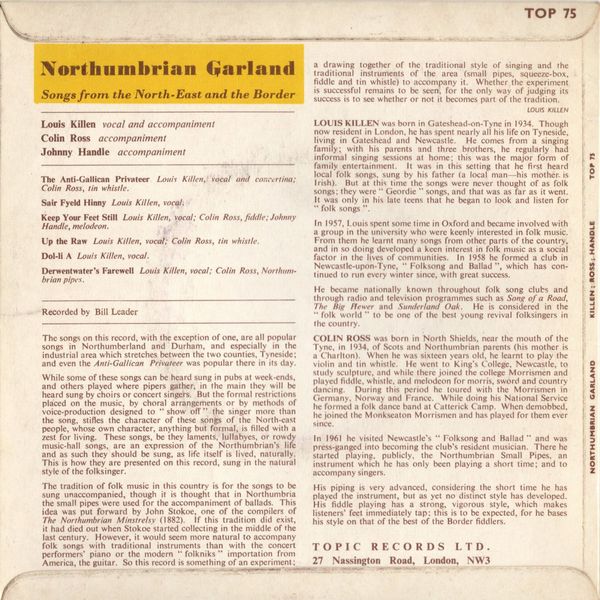
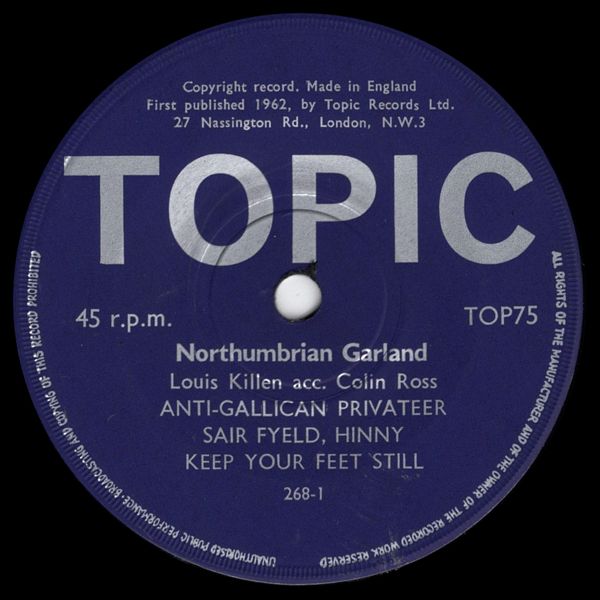
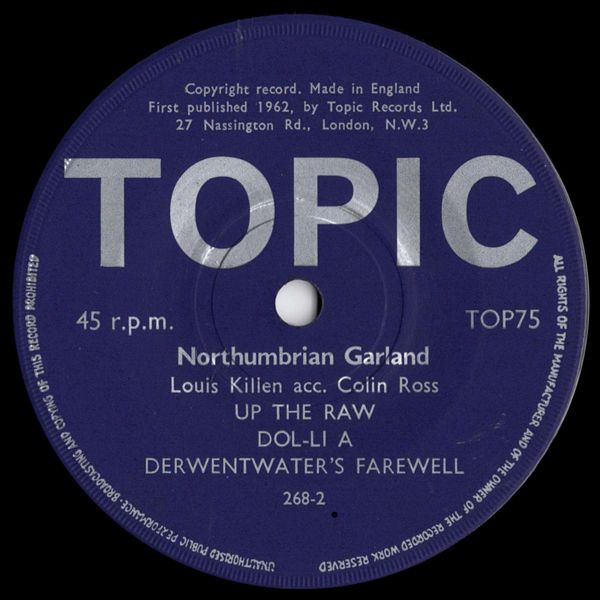 |
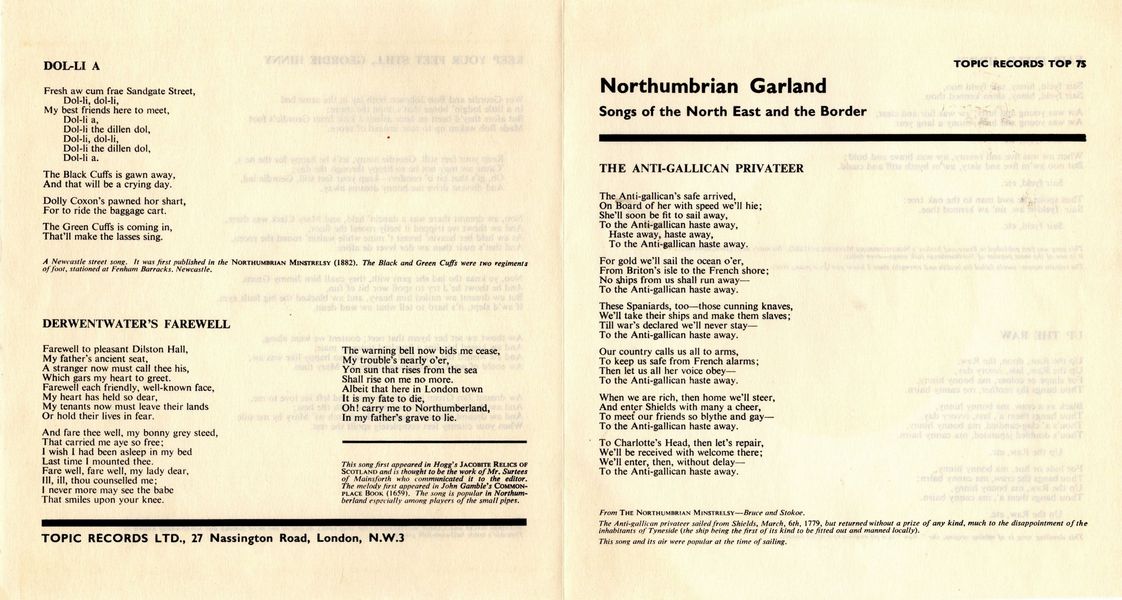
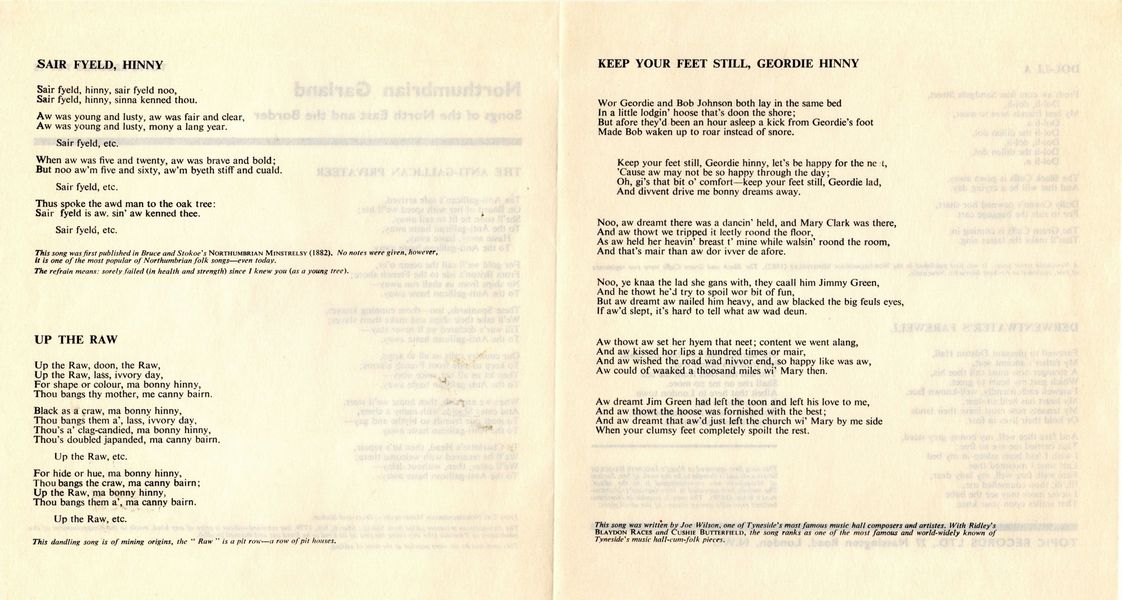 |
Sleeve Notes
The songs on this record, with the exception of one, are all popular songs in Northumberland and Durham, and especially in the industrial area which stretches between the two counties, Tyneside; and even the Anti-Gallican Privateer was popular there in its day.
While some of these songs can be heard sung in pubs at week-ends, and others played where pipers gather, in the main they will be heard sung by choirs or concert singers. But the formal restrictions placed on the music, by choral arrangements or by methods of voice-production designed to "show off" the more than the song, stifles the character of these songs of the North-east people, whose own character, anything but formal, is filled with a zest for living. These songs, be they laments, lullabyes, or rowdy music-hall songs, are an expression of the Northumbrian's life and as such they should be sung, as life itself is lived, naturally. This how they are presented on this record, sung in the natural style of the folksinger.
The tradition of folk music in this country is for the songs to be sung unaccompanied, though it is thought that in Northumbria the small pipes were used for the accompaniment of ballads. This idea was put forward by John Stokoe, one of the compilers of The Northumbrian Minstrelsy (1882). If this tradition did exist, it had died out when Stokoe started collecting in the middle of the last century. However, it would seem more natural to accompany folk songs with traditional instruments than with the concert performers' piano or the modern "folkniks" importation from America, the guitar. So this record is something of an experiment; a drawing together of the traditional style of singing and the traditional instruments of the area (small pipes, squeeze-box, fiddle and tin whistle) to accompany it. Whether the experiment is successful remains to be seen, for the only way of judging its success is to see whether or not it becomes part of the tradition.
LOUIS KILLEN
LOUIS KILLEN was born in Gateshead-on-Tyne in 1934. Though now resident in London, he has spent nearly all his life on Tyneside, living in Gateshead and Newcastle. He comes from a singing family; with his parents and three brothers, he regularly had family entertainment. It was in this setting that he first heard local folk songs, sung by his father (a local man—his mother is Irish). But at this time the songs were never thought of as folk songs; they were "Geordie" songs and that was a far as it went. It was only in his late teens that he began to look and listen for "folk songs".
In 1957, Louis spent some time in Oxford and became involved with a group in the university who were keenly interested in folk music. From them he learnt many songs from other parts of the country, and in so doing developed a keen interest in folk music as a social factor in the lives of communities. In 1958 he formed a club in Newcastle-upon-Tyne, "Folksong and Ballad", which has continued to run every winter since, with great success.
He became nationally known throughout folk song clubs and through radio and television programmes such as Song of a Road, The Big Hewer and Sunderland Oak. He is considered in the "folk world" to be one of the best young revival folksingers in the country.
COLIN ROSS was born in North Shields, near the mouth of the Tyne, in 1934, of Scots and Northumbrian parents (his mother is a Charlton). When he was sixteen years old, he learnt to play the violin and tin whistle. He went to King's College, Newcastle, to study sculpture, and while there joined the college Morrismen and played fiddle, whistle, and melodeon for morris, sword and country dancing. During this period he toured with the Morrismen in Germany, Norway and France. While doing his National Service he formed a folk dance band at Catterick Camp. When demobbed, he joined the Monkseaton Morrismen and has played for them ever since.
In 1961 he visited Newcastle's "Folksong and Ballad" and was press-ganged into becoming the club's resident musician. There he started playing, publicly, the Northumbrian Small Pipes, an instrument which he has only been playing a short time; and to accompany singers.
His piping is very advanced, considering the short time he has played the instrument, but as yet no distinct style has developed. His fiddle playing has a strong, vigorous style, which makes listeners' feet immediately tap: this to be expected, for he bases his style on that of the best of the Border fiddlers.
THE ANTI-GALLICAN PRIVATEER
The Anti-gallican's safe arrived,
On Board of her with speed we'll hie;
She'll soon be fit to sail away,
To the Anti-gallican haste away,
Haste away, haste away,
To the Anti-gallican haste away.
For gold we'll sail the ocean o'er,
From Briton's isle to the French shore;
No ships from us shall run away—
To the Anti-gallican haste away.
These Spaniards, too—those cunning knaves,
We'll take their ships and make them slaves;
Till war's declared we'll never stay—
To the Anti-gallican haste away.
Our country calls us all to arms,
To keep us safe from French alarms;
Then let us all her voice obey—
To the Anti-gallican haste away.
When we are rich, then home we'll steer,
And enter Shields with many a cheer,
To meet our friends so blythe and gay—
To the Anti-gallican haste away.
To Charlotte's Head, then let's repair,
We'll be received with welcome there;
We'll enter, then, without delay—
To the Anti-gallican haste away.
From THE NORTHUMBRIAN MINSTRELSY—Brace and Stokoe.
The Anti-gallican privateer sailed from Shields, March, 6th, 1779, but returned without a prize of any kind, much to the disappointment of the inhabitants of Tyneside {the ship being the first of its kind to be fitted out and manned locally).
This song and its air were popular at the time of sailing.
SAIR FYELD, HINNY
Sair fyeld, hinny, sair fyeld noo,
Sair fyeld, hinny, sinna kenned thou.
Aw was young and lusty, aw was fair and clear,
Aw was young and lusty, mony a lang year.
Sair fyeld, etc.
When aw was five and twenty, aw was brave and bold;
But noo aw'm five and sixty, aw'm byeth stiff and cuald.
Sair fyeld, etc.
Thus spoke the awd man to the oak tree:
Sair fyeld is aw. sin' aw kenned thee.
Sair fyeld, etc.
This song was first published in Bruce and Stokoe's NORTHUMBRIAN MINSTRELSY (1882). No notes were given, however, it is one of the most popular of Northumbrian folk songs—even today. The refrain means: sorely failed (in health and strength) since I knew you (as a young tree).
UP THE RAW
Up the Raw, doon, the Raw,
Up the Raw, lass, ivvory day,
For shape or colour, ma bonny hinny,
Thou bangs thy mother, me canny bairn.
Black as a craw, ma bonny hinny,
Thou bangs them a', lass, ivvory day,
Thou's a' clag-candied, ma bonny hinny,
Thou's doubled japanded, ma canny bairn.
Up the Raw, etc.
For hide or hue, ma bonny hinny,
Thou bangs the craw, ma canny bairn;
Up the Raw, ma bonny hinny,
Thou bangs them a', ma canny bairn.
Up the Raw, etc.
This dandling song is of mining origins, the "Raw" is a pit row—a row of pit houses.
KEEP YOUR FEET STILL, GEORDIE HINNY
Wor Geordie and Bob Johnson both lay in the same bed
In a little lodgin' hoose that's doon the shore;
But afore they'd been an hour asleep a kick from Geordie's foot
Made Bob waken up to roar instead of snore.
Keep your feet still, Geordie hinny, let's be happy for the neet,
'Cause aw may not be so happy through the day;
Oh, gi's that bit o' comfort—keep your feet still, Geordie lad,
And divvent drive me bonny dreams away.
Noo, aw dreamt there was a dancin' held, and Mary Clark was there,
And aw thowt we tripped it leetly roond the floor,
As aw held her heavin' breast t' mine while walsin' roond the room.
And that's mair than aw dor ivver de afore.
Noo, ye knaa the lad she gans with, they caall him Jimmy Green,
And he thowt he'd try to spoil wor bit of fun,
But aw dreamt aw nailed him heavy, and aw blacked the big feuls eyes,
If aw'd slept, it's hard to tell what aw wad deun.
Aw thowt aw set her hyem that neet; content we went alang,
And aw kissed hor lips a hundred times or mair,
And aw wished the road wad nivvor end, so happy like was aw,
Aw could of waaked a thoosand miles wi' Mary then.
Aw dreamt Jim Green had left the toon and left his love to me,
And aw thowt the hoose was fornished with the best;
And aw dreamt that aw'd just left the church wi' Mary by me side
When your clumsy feet completely spoilt the rest.
This song was written by Joe Wilson, one of Tyneside's most famous music hall composers and artistes. With Ridley's BLAYDON RACES and CUSHIE BUTTERFIELD, the song ranks as one of the most famous and world-widely known of Tyneside's music hall-cum-folk pieces.
DOL-LI A
Fresh aw cum frae Sandgate Street,
Dol-li, dol-li,
My best friends here to meet,
Dol-li a,
Dol-li the dillen dol,
Dol-li, dol-li,
Dol-li the dillen dol,
Dol-li a.
The Black Cuffs is gawn away,
Dol-li, dol-li,
And that will be a crying day.
Dol-li a, etc …
Dolly Coxon's pawned hor shart,
For to ride the baggage cart.
The Green Cuffs is coming in,
That'll make the lasses sing.
A Newcastle street song. It was first published in the NORTHUMBRIAN MINSTRELSY (1882). The Black and Green Cuffs were two regiments of foot, stationed at Fenham Barracks, Newcastle.
DERWENTWATER'S FAREWELL
Farewell to pleasant Dilston Hall,
My father's ancient seat,
A stranger now must call thee his,
Which gars my heart to greet.
Farewell each friendly, well-known face,
My heart has held so dear,
My tenants now must leave their lands
Or hold their lives in fear.
And fare thee well, my bonny grey steed,
That carried me aye so free;
I wish 1 had been asleep in my bed
Last time I mounted thee.
Fare well, fare well, my lady dear,
Ill, ill, thou counselled me;
I never more may see the babe
That smiles upon your knee.
The warning bell now bids me cease,
My trouble's nearly o'er,
Yon sun that rises from the sea
Shall rise on me no more.
Albeit that here in London town
It is my fate to die,
Oh! carry me to Northumberland,
In my father's grave to lie.
This song first appeared in Hogs's JACOBITE RELICS OF SCOTLAND and is thought to be the work of Mr. Surtees of Mainsforth who communicated it to the editor. The melody first appeared in John Gamble's COMMONPLACE BOOK (1659). The song is popular in Northumberland especially among players of the small pipes.